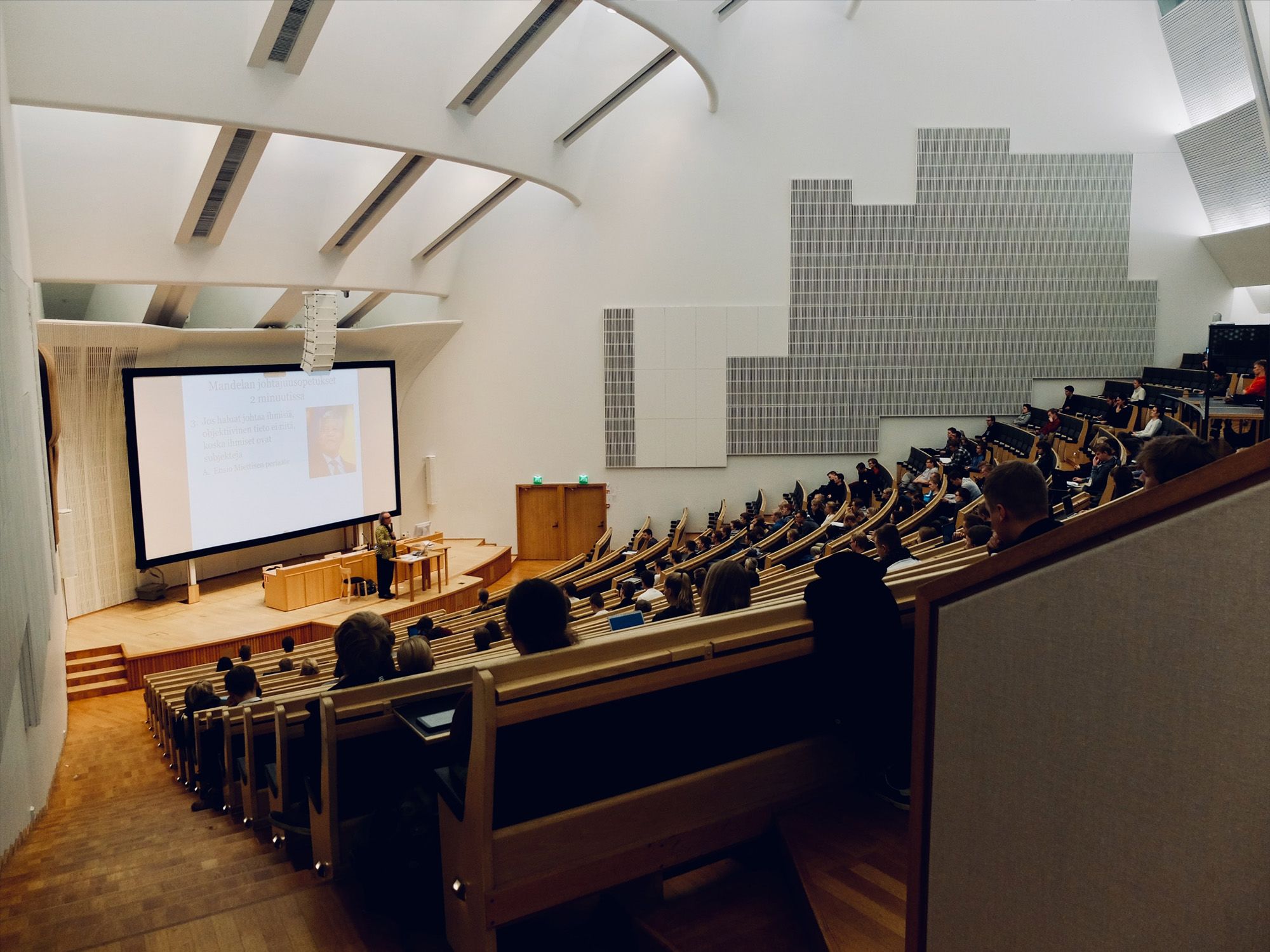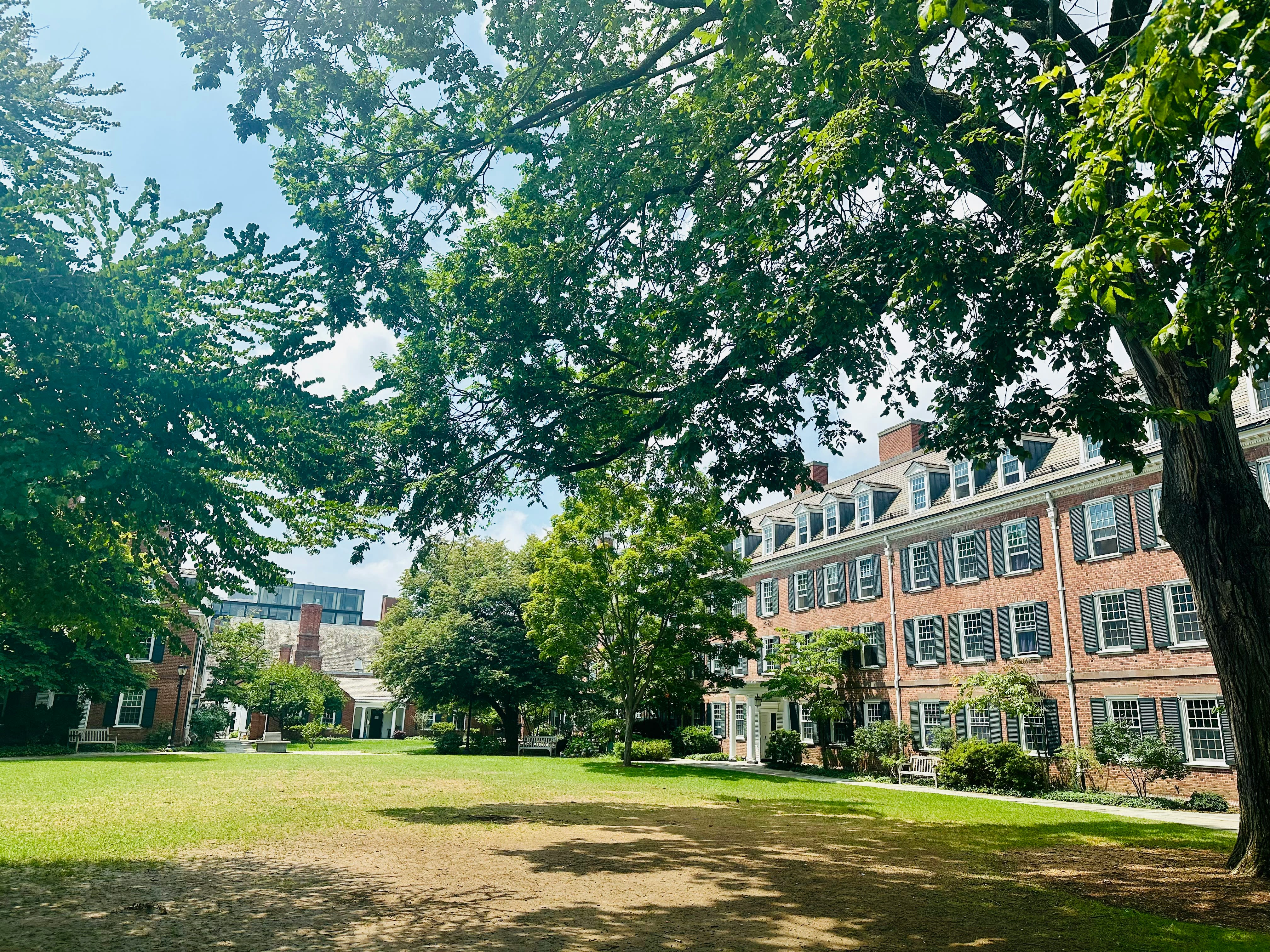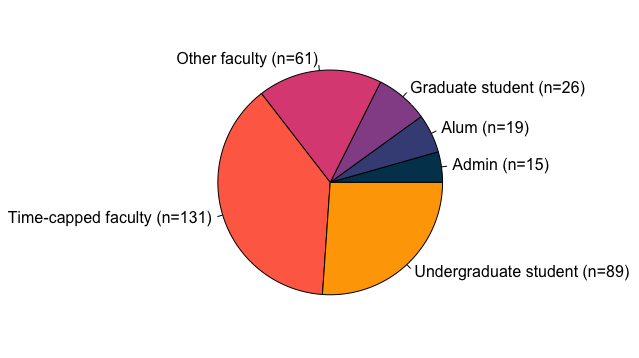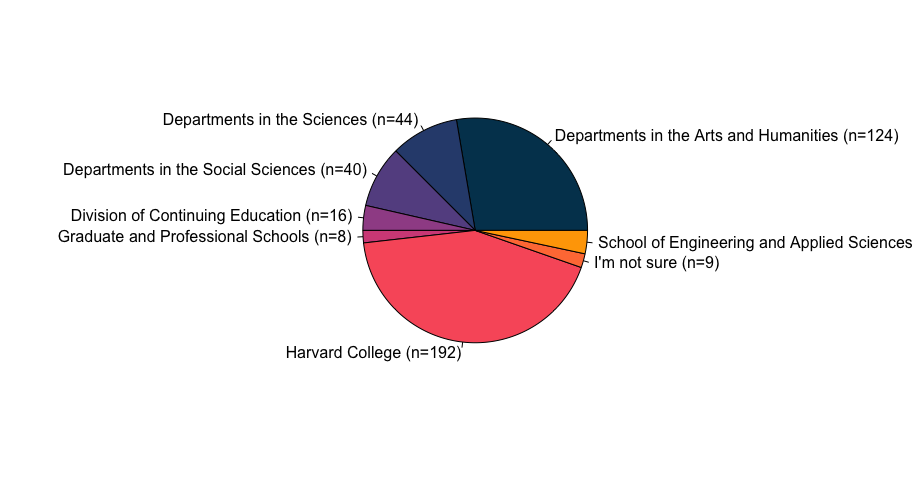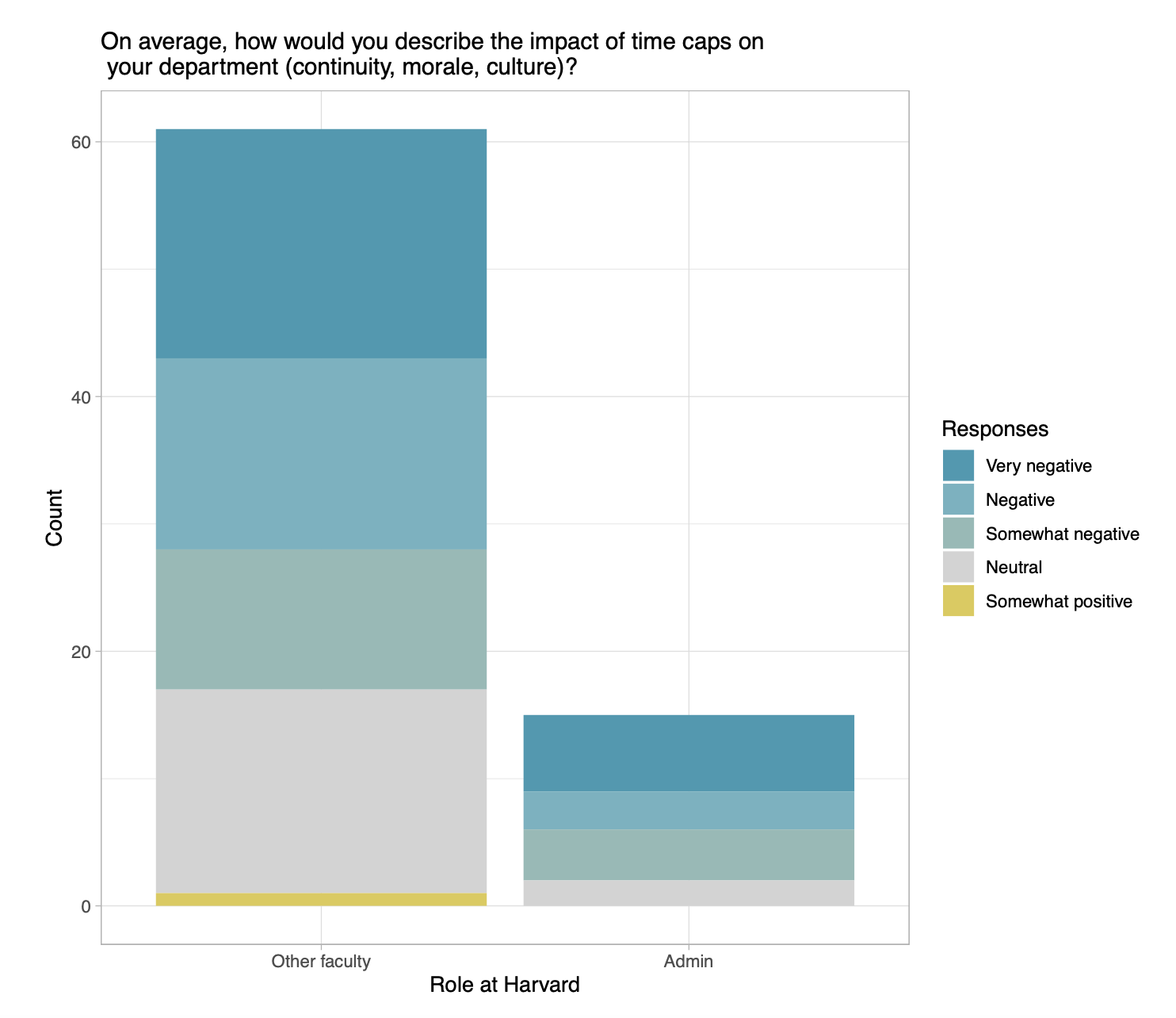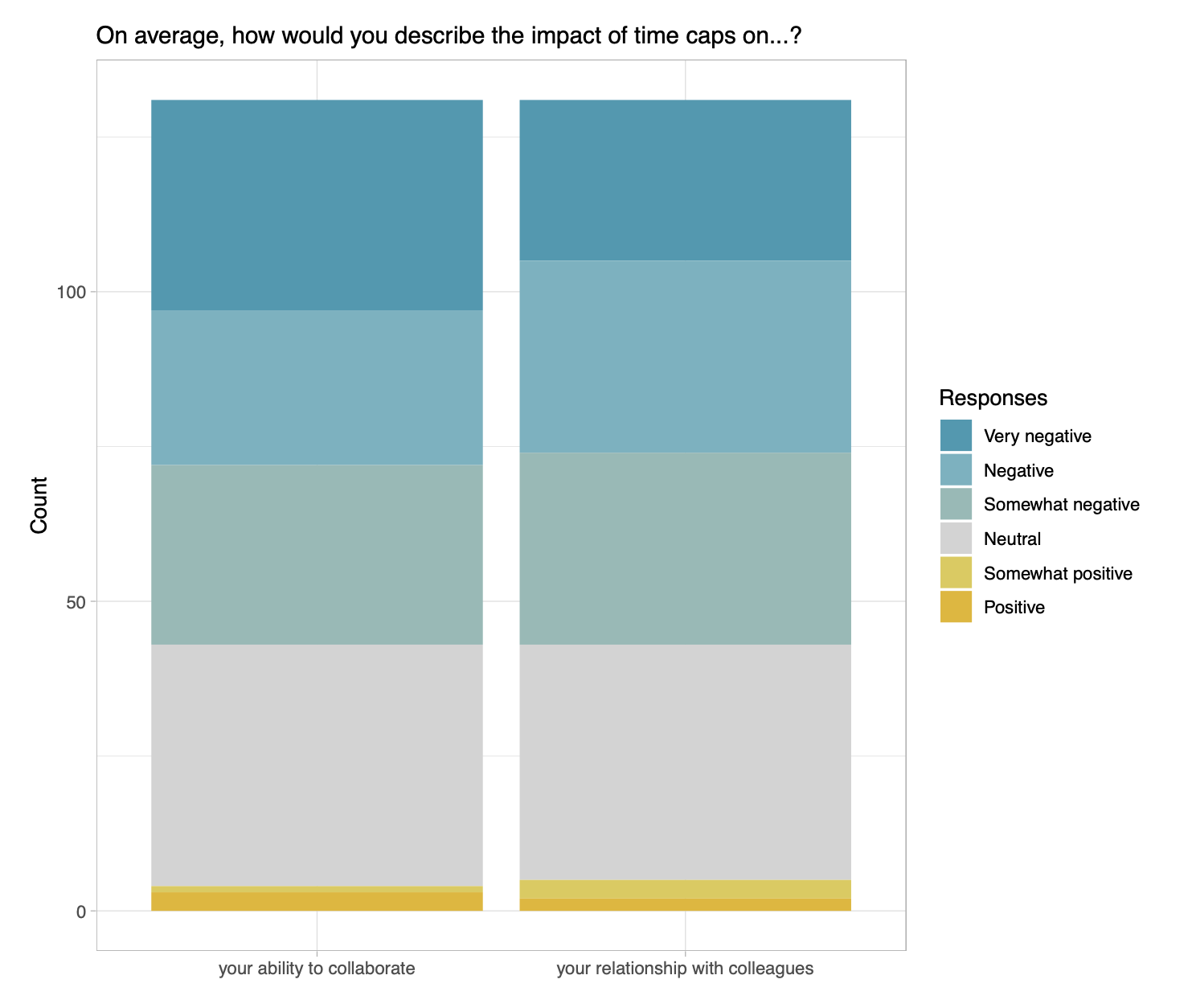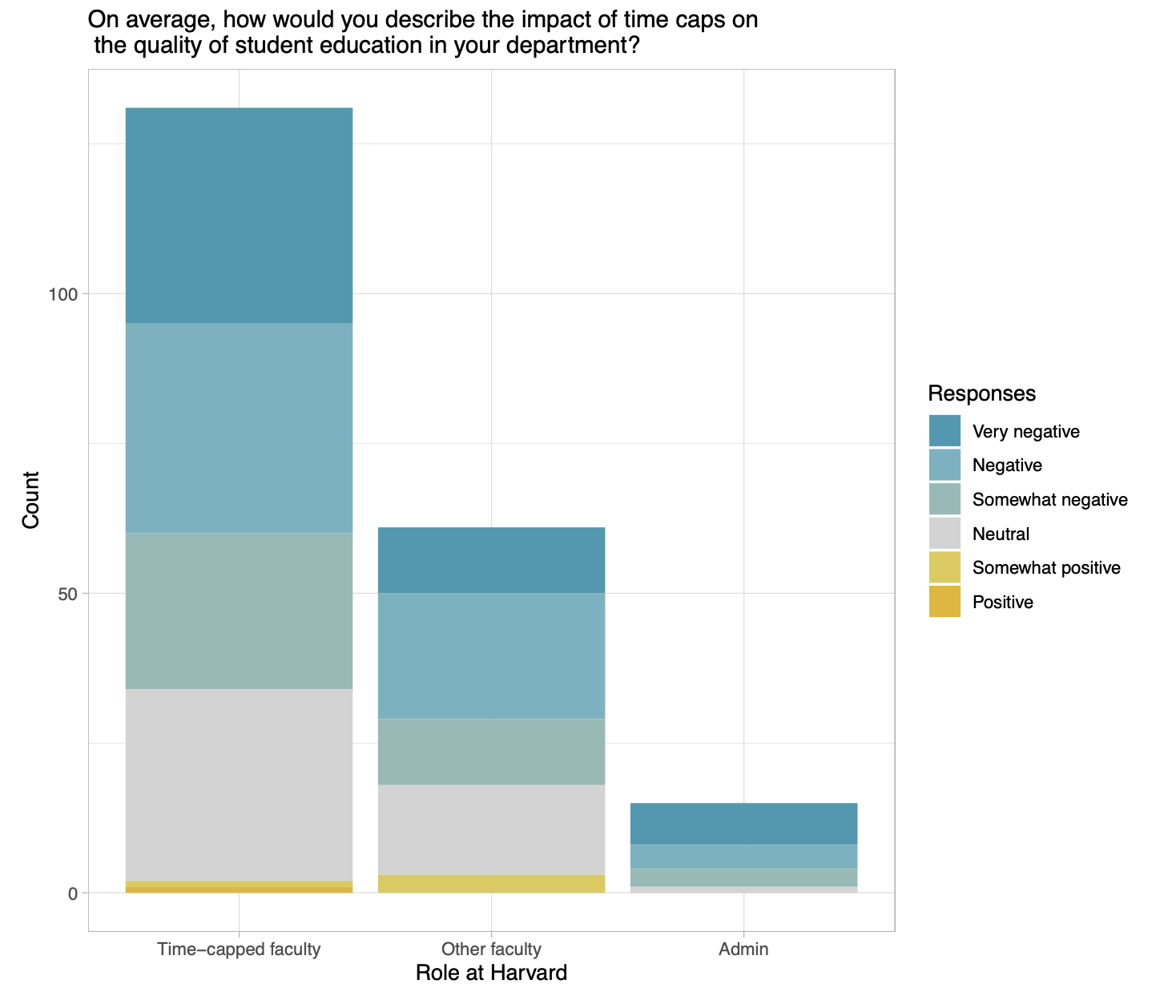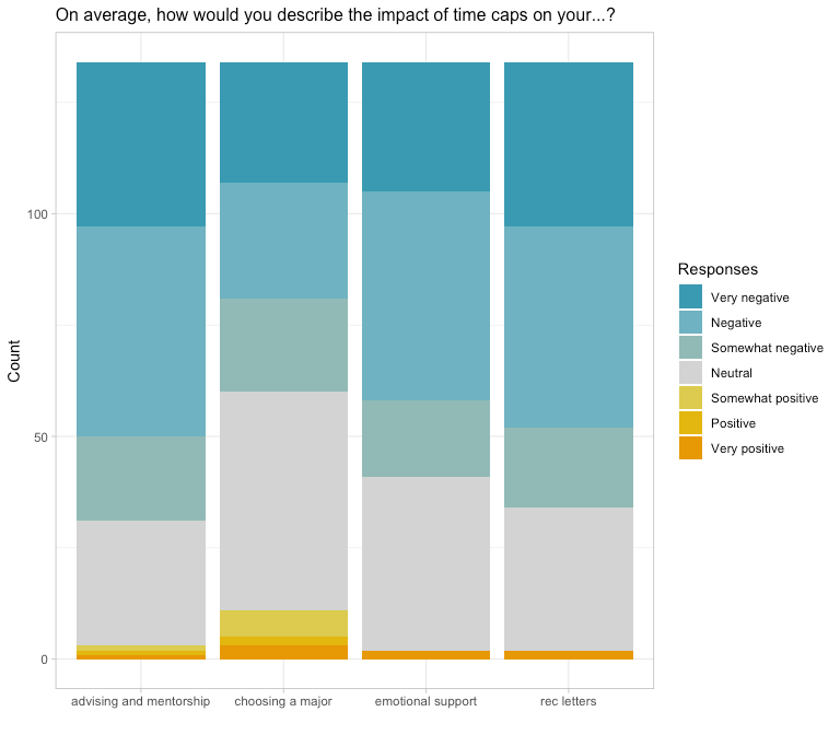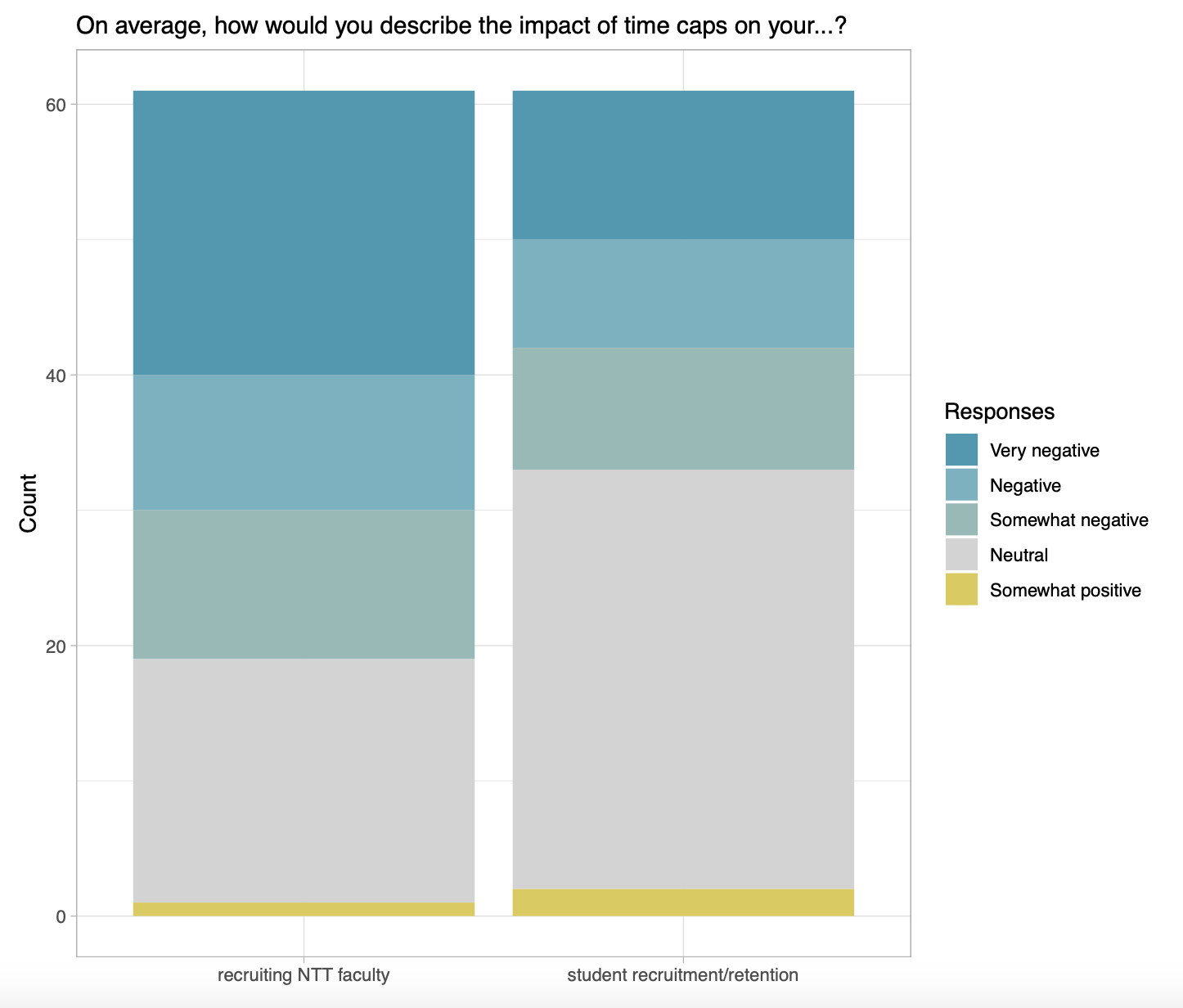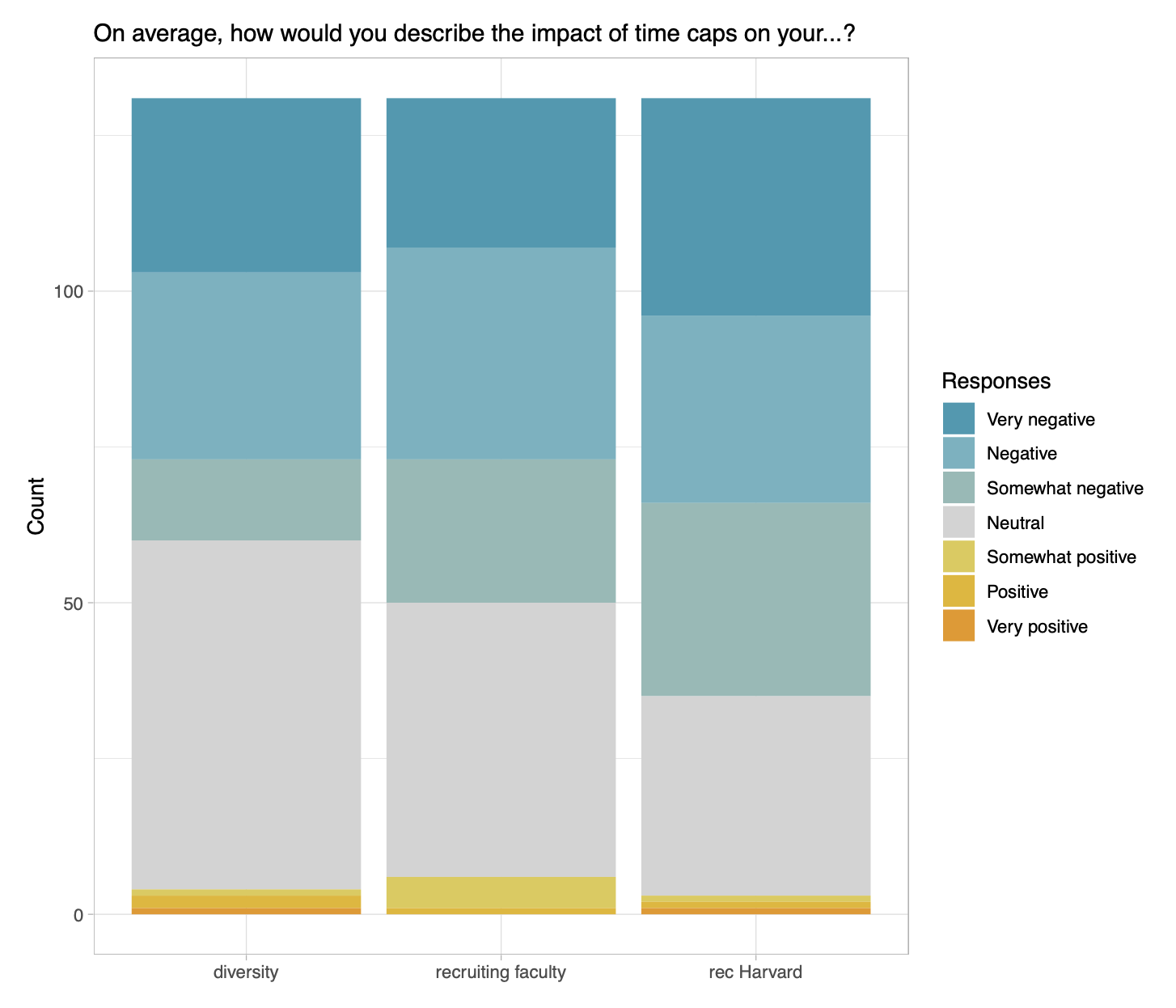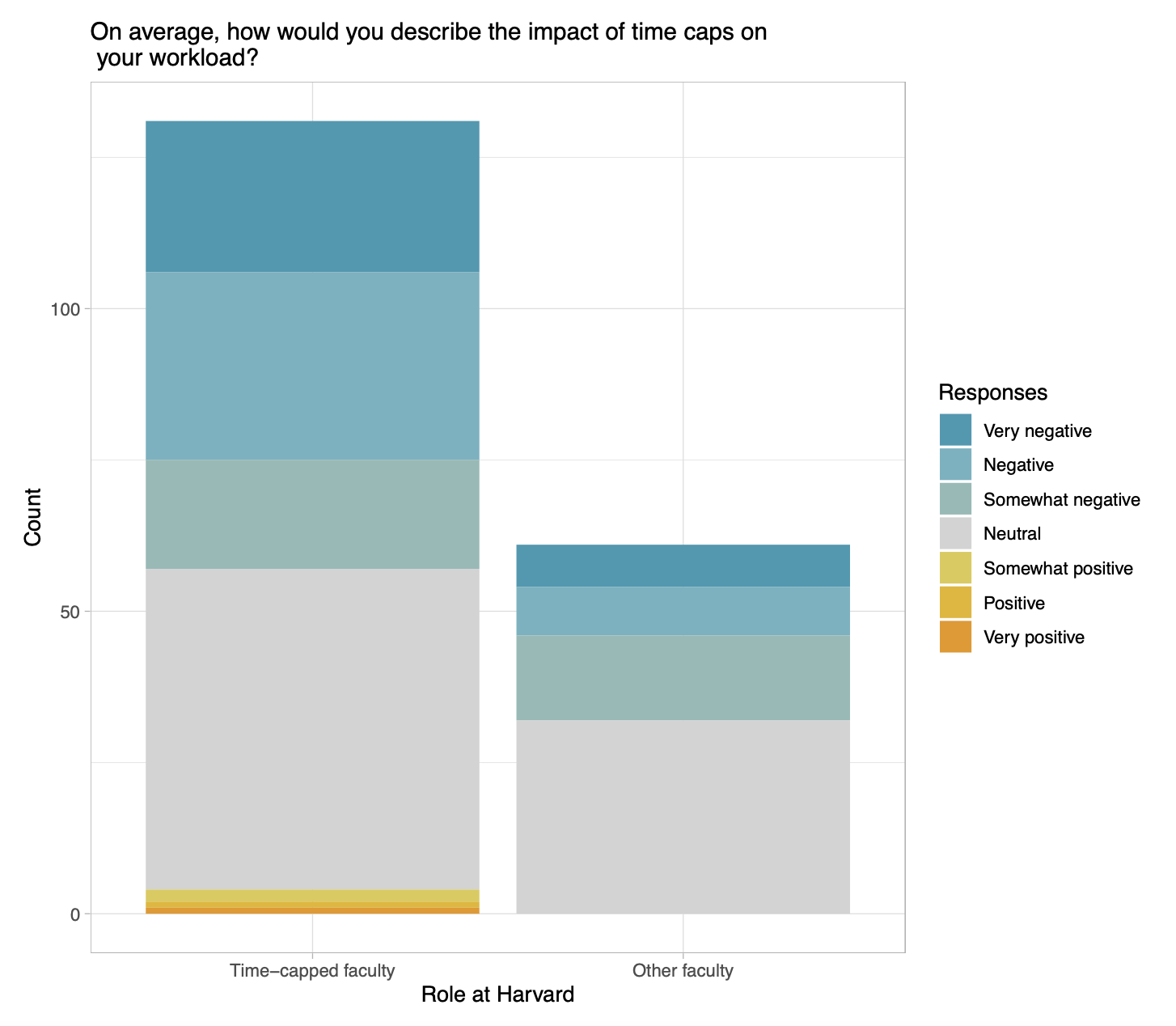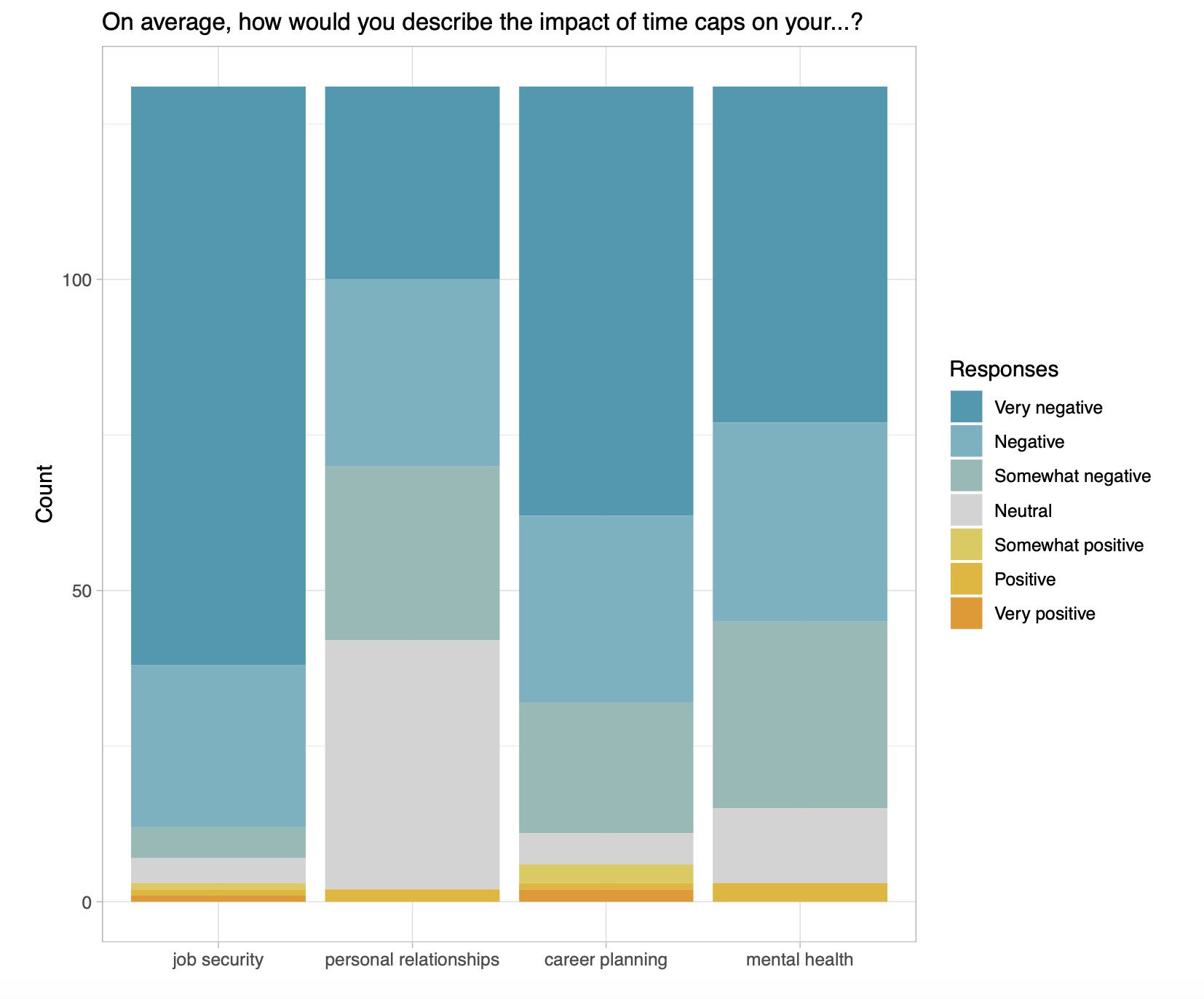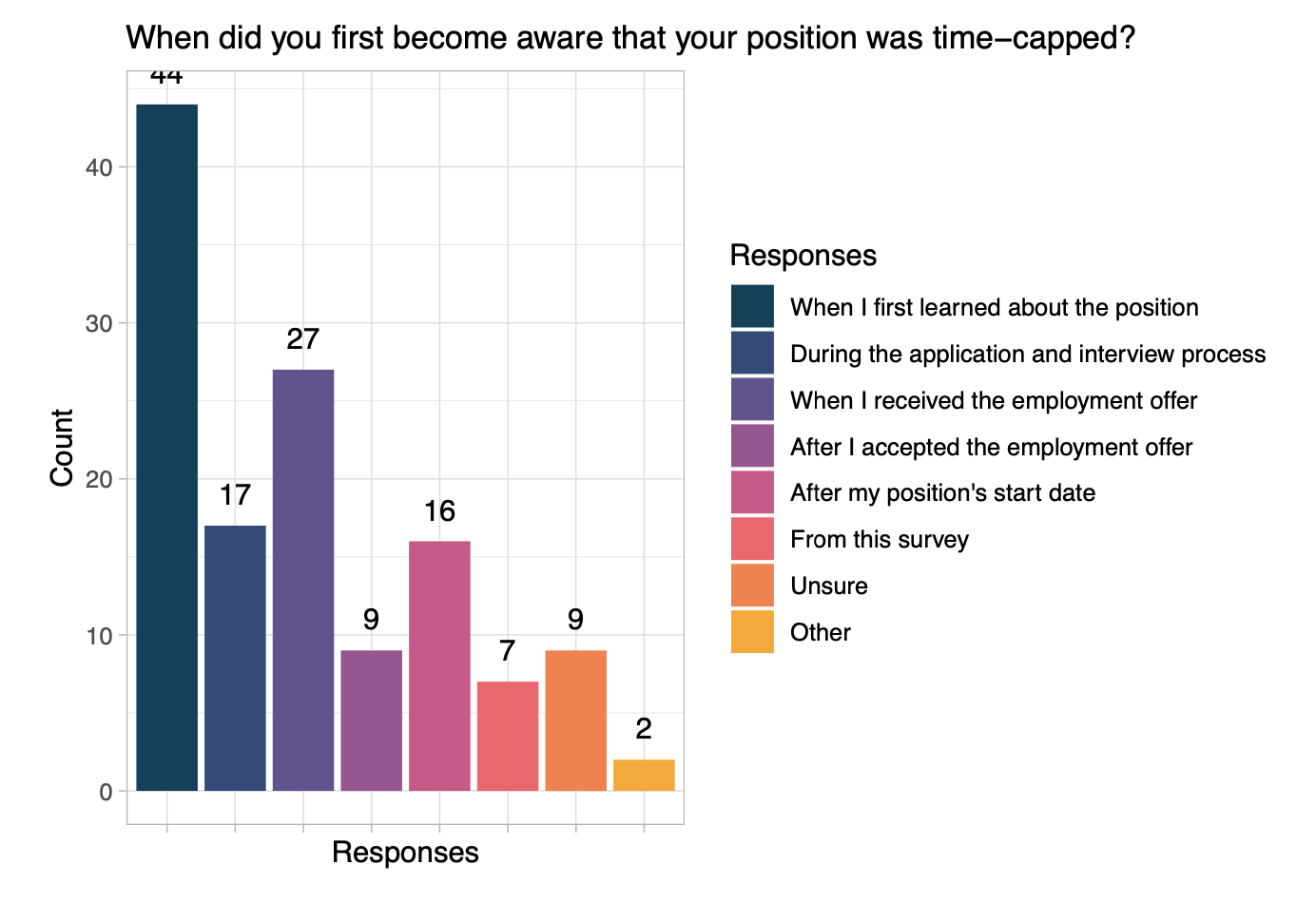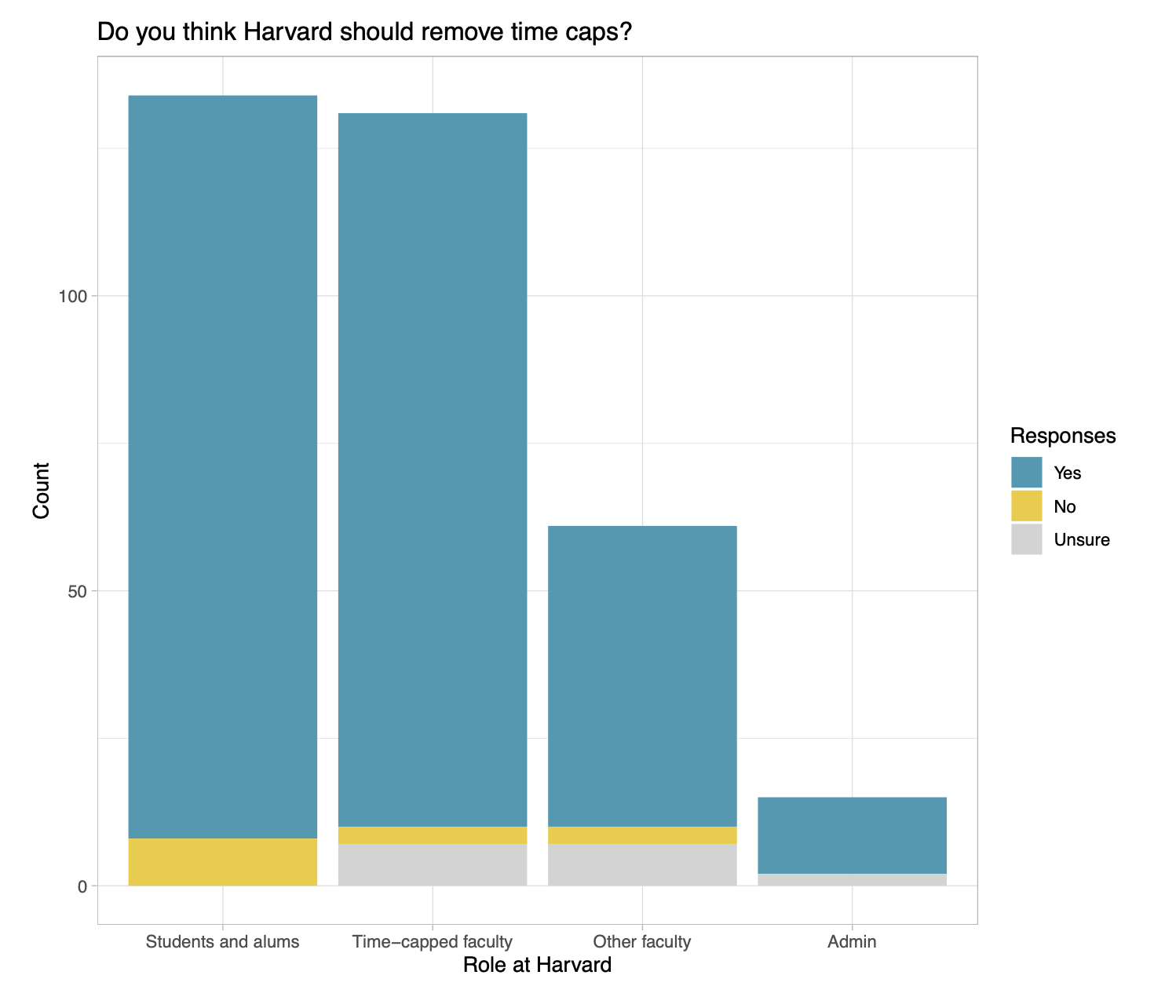October 2024
Report on Faculty Time Caps at Harvard University

The Time Caps Working Group surveyed faculty, staff, students, and alumni of the Faculty of Arts and Sciences (FAS). We received 341 responses from employees (mostly ladder and non-ladder faculty) and students (mainly undergraduates). Survey respondents overwhelmingly support (91.2%) lifting FAS’s time caps policy. Our survey results identify areas that would be improved by removing time caps.
We identified that the FAS time caps policy negatively impacts the following:
- Collaboration/Interdisciplinarity: Ladder faculty and administrators report largely negative impacts on the continuity, morale, and culture of departments. Time-capped faculty report largely negative impacts on collaboration and interdisciplinary work.
- Colleague Relationships: Time-capped faculty report largely negative impacts on colleague relationships.
- Quality of Education: Ladder faculty, time-capped faculty, and administrators report negative effects on the quality of education. Students and alumni highlight that time caps hinder the mentorship and emotional support they receive from faculty subject to time caps. 42% of students and alumni report having lost teachers and mentors due to time caps–related policies.
- Diversity: Time-capped faculty report negative impacts on diversity.
- Recruitment: Ladder faculty report largely negative impacts, primarily on recruiting and retaining faculty for non-ladder positions, but also on student recruitment and retention. Time-capped faculty report negative impacts on recruitment and their ability to recommend working at Harvard.
- Direct Impact on Quality of Life: Both ladder faculty and time-capped faculty report negative or neutral impacts on workload. Time-capped faculty also report overwhelmingly negative career and mental health impacts.
Download the full report
The information on this website along with the document at the link below together comprise our Report on Faculty Time Caps at Harvard University.
Background
Learn about time caps at Harvard University

Time Caps for Non-Ladder Faculty Positions at Harvard
Within the Faculty of Arts and Sciences, many non-ladder teaching positions are subject to term limits—or “time caps”—imposed by the FAS’s administration. Workers in these positions, including College Fellows, Lecturers, Preceptors, and Teaching Assistants, “time out” of employment after a fixed number of years. According to the FAS’s Eight-Year Rule in its Appointment and Promotion Handbook, time-capped faculty may not hold any combination of non-ladder appointments for more than 8 years, “regardless of how many or what type of appointments (including teaching assistantships and tenure-track faculty appointments) the individual has held in the past.” Though the numbers of term-limited non-ladder faculty change semester to semester, the time caps policy affects upwards of 500 non-ladder faculty in more than 55 FAS departments, centers, or programs.
The FAS’s policy of time caps has been considered and upheld by two different committees at three different junctures: in 2009 and in 2018 by the Advisory Committee on Non-Ladder Appointments, and in 2020 by the FAS Preceptor System Review Committee. However, none of these assessments approached the issue in a data-driven, comprehensive manner, and as our survey reveals, their reports included serious flaws.
These committees reports’ reaffirmed the policy’s pedagogical soundness; the 2009 Committee claimed that “many of the teaching functions held by non-ladder faculty are highly demanding and require regeneration that brings in fresh ideas, new talent, and the most recent pedagogical techniques” (page 39). While this Committee was charged with answering the question “How do our current term limits affect the recruitment and retention of non-ladder teachers, especially those that prove to be excellent?” (page 49), the Committee’s report did not describe the effect of time caps on retention and recruitment in their two-paragraph–long section on “Hiring and Retention” (page 32). A 2018 report filed by the Advisory Committee on Non-Ladder Appointments reaffirmed the pedagogical utility of time-capped teaching positions in the FAS: “For example, in fields which are constantly evolving...or else where students’ intellectual interests continually change and require different areas of faculty expertise...the ability to regularly turn over teaching staff at the non-ladder level serves an essential educational purpose” (cited in page 1 of 2020 FAS Preceptor System Review Committee report released in 2021). In the 2020 FAS Preceptor System Review Committee’s 2021 report, time caps were not reviewed—instead, the 2021 report noted that term limits had been “studied and strongly affirmed by the 2009 and 2018 committees” (page 1). No further review or discussion on term limits was supplied in the committee’s report released in 2021.
The FAS’s Division of Science also conducted a climate survey in Fall 2020 and published these results in a 2021 report. This report did not address the impact of time caps on the Division’s faculty members, students, and staff.
One report, the 2021 Arts and Humanities Climate Survey Report, did suggest the damaging effects of time caps on faculty: “Many [time-capped survey respondents] explained how the time-limited nature of their jobs (three-year contracts, with the possibility, in some cases, for renewal) is a constant source of stress which has led to relatively frequent turnover and lower institutional commitment. It has also made non-ladder faculty feel unappreciated and disposable, necessitated training of new hires on a relatively frequent basis, and contributed to a lack of consistency and stability for students” (page 9). The 2021 Report also noted that previous efforts to review non-ladder positions at FAS, notably the FAS Preceptor System Review Committee in 2019, failed to fairly and adequately analyze non-ladder positions. The 2021 Report detailed that survey respondents criticized “the [FAS Preceptor System Review Committee] report’s methodology, interpretation of results, the validity of conclusions, and fairness of outcomes” (page 11).
Our report follows up on this key insight and sets out to correct previous surveys’ shortcomings.
Non-Ladder Faculty Positions at Peer Institutions
The FAS/SEAS time cap is unique among peer institutions in the Ivy League and within Harvard itself. There is no comparable policy among Ivy League institutions. Institutions which do not have comparable time caps include:
- Brown University
- Columbia University
- Cornell University
- Dartmouth College
- Princeton University
- The University of Pennsylvania
- Yale University
Among Harvard’s professional schools, the following do not have time caps: Harvard Business School, Harvard Divinity School, Harvard Graduate School of Education, Harvard John F. Kennedy School of Government, Harvard Law School, Harvard Medical School, and Harvard T.H. Chan School of Public Health. The Harvard Graduate School of Design has a 15-year time cap on service for some faculty.
Time caps are not only rare, but extraordinary. For example, the following institutions do not have time caps:
- The California Institute of Technology
- Duke University
- Johns Hopkins University
- The Massachusetts Institute of Technology
- Northwestern University
- Stanford University
- The University of California
- The University of Chicago
- The University of Michigan
- The University of Texas
At the time of writing, the Working Group was able to identify only one other institution of higher learning with a faculty time cap similar to the one in Harvard FAS/SEAS: Howard University.
Time Caps Working Group: Who We Are and What We Surveyed
We formed the Time Caps Working Group to address the shortcomings and gaps of previous committees and surveys at Harvard University that were meant to analyze term-limited non-ladder faculty positions. Our survey and report supplement and correct previous efforts to describe the impacts of time caps on different departments and Divisions in the FAS. Previous committees and reports failed to document how time caps affect department climate, workload, and quality of education. Our work documents these impacts and adds the student, ladder faculty, and administrative perspectives on time caps.
The Time Caps Working Group is composed of non–tenure-track faculty and other stakeholders in the Faculty of Arts and Sciences working together to lift restrictions on departments’ ability to retain excellent and experienced faculty. Through conversations with colleagues, students, professional staff, and department chairs, we have observed broad dissatisfaction with the FAS’s time caps. With the help of the Harvard Academic Workers-United Auto Workers (HAW-UAW), we then conducted a survey of the FAS to learn more about how this policy affects its members.
The survey was distributed widely through email, Harvard listservs, and social media. Responses were collected from 4 December 2023 through 28 March 2024. While the Harvard Academic Workers (HAW-UAW) logo appears on the survey, the survey clearly states that it is not a bargaining survey. The survey’s goal was to gather data on how FAS time caps impact various stakeholders.
We received a total of 341 responses from six different stakeholder groups at Harvard University.
Photo by Bernd Klutsch on Unsplash
Photo by Bernd Klutsch on Unsplash
Photo by Richard Liu on Unsplash
Photo by Richard Liu on Unsplash
Photo by Xiangkun ZHU on Unsplash
Photo by Xiangkun ZHU on Unsplash
Photo by Chenyu Guan on Unsplash
Photo by Chenyu Guan on Unsplash
Background on Survey Respondents
Primary role at Harvard
The number of respondents who self-identified with the following stakeholder groups is provided below:
The survey was primarily completed by current faculty (192 total, including 131 who indicated being subject to time caps policies) and students (115 total, primarily undergraduates). For ease of reporting in the rest of the report, students and alumni are grouped together when appropriate.
Schools and departments across Harvard
The survey aimed to capture the experiences of those directly or indirectly affected by time caps policies within the FAS but was open to all. Respondents were permitted to select more than one school or departmental affiliation. The majority of affiliations were with departments within the FAS and/or Harvard College, with respondents most frequently reporting affiliations within the Arts and Humanities (124 affiliations). However, a sizable number of respondents were also from the Sciences or Social Sciences (84 affiliations combined). Although we do not report the number of respondents per department to protect the anonymity of participants from small departments, a relatively larger number of participants reported affiliations with the Harvard College Writing Program, History and/or Literature, as well as departments teaching world languages. These affiliations reflect the relatively larger number of participants from the Arts and Humanities. Departments within the Sciences and Social Sciences with a larger number of affiliations include Psychology, Human Evolutionary Biology, and various departments pertaining to mathematics or statistics.
Survey respondents by primary role at Harvard
Survey respondents by primary role at Harvard
Survey respondents by schools and departments at Harvard
Survey respondents by schools and departments at Harvard
Results
Read our findings after surveying the Harvard community

Collaboration, interdisciplinarity, and collegiality
We find that ladder faculty and administrators report largely negative impacts on the continuity, morale, and culture of departments.
We also find that time-capped faculty report largely negative impacts on collaboration and interdisciplinary work.
Other faculty and administrators report largely negative impacts on department continuity, morale, and culture
When asked “On average, how would you describe the impact of time caps on your department (continuity, morale, culture)?” the vast majority (72%) of non–time-capped faculty reported “Very negative,” “Negative,” or “Somewhat negative” impacts. Very few (<2%) reported “Somewhat positive” impacts. One ladder faculty member reported that “it is difficult to foster and maintain community. Everyone has one foot out the door.”
More than 50% of administrative respondents reported “Negative” or “Very negative” to the same question. No respondent reported “Somewhat positive” or “Positive.”
Time-capped faculty report largely negative impacts on collaboration and relationships with colleagues
Of time-capped faculty, two-thirds (67%) responded with “Very negative,” “Negative,” or “Somewhat negative” when asked about how time caps affect their collaborations and relationships with colleagues. Many time-capped faculty mentioned their limited terms as reasons for why they did not attempt to forge more connections with collaborators or start long-term pedagogical or research projects on campus.
Affected faculty reported that time caps kept them from “forming relationships with [their] colleagues and students” and undermined their relationship with Harvard as an institution: “It makes me not want to collaborate with anyone or contribute to anything of lasting value in the institution. Why would I do anything for Harvard if they are going to spit me out?” High rates of turnover in departments with large numbers of time-capped faculty leave those departments feeling “transient and [with] no direction.” Similarly, another respondent emphasized that time caps make it impossible “to carry out long-term improvement projects,” since departments “are constantly bleeding institutional knowledge.” This has a strikingly negative effect on workplace culture; as one survey respondent put it, “Seeing valued colleagues forced out of the program every year has crushed morale in our program.” However, time-capped faculty stressed that without time caps, their ability to collaborate would enhance opportunities for student learning: “[Without time caps] I could build partnerships with community organizations for community-based learning, knowing those partnerships could last.”
Key points on collaboration, interdisciplinarity, and collegiality
Over two-thirds of time-capped and non–time-capped faculty reported negative impacts to departmental culture, collaboration, and collegiality.
Faculty respondents report that time caps hinder community building, collaboration, and the development of pedagogical and research projects. High turnover, low morale, and negative workplace culture go hand-in-hand.
Time-capped faculty
Time-capped faculty
Quality of student education
Faculty and administrators largely report negative impacts of time caps on the quality of student education.
Students and alumni data highlight how time caps harm their mentorship and emotional support opportunities.
Faculty and administrators largely report negative impacts on the quality of student education
A large majority of time-capped (74%) and non–time-capped (70%) faculty reported that the impact of time caps on the quality of student education in their departments was negative, with more than half (54% and 52%, respectively) reporting “Very negative” or “Negative” impacts. Grouping all faculty responses together, a total of five respondents (<3%) noted “Somewhat positive” or “Positive” impacts of time caps on the quality of student education in their departments.
The vast majority of administrative staff (93%) also responded that the impact of time caps on the quality of student education in their departments was negative, and none reported positive impacts of any degree.
Qualitative feedback indicates that time caps leave faculty with less time and energy to dedicate to student education. One time-capped respondent wrote, “Term-limited faculty are working a double-shift: teaching by day and keeping abreast of the job market (and attempting to remain marketable by publishing).” Another noted that “Time caps mean that I spend an immense amount of time training and hiring new colleagues.” Other respondents agreed, emphasizing the burden that hiring and training a constant stream of new faculty places on existing faculty and administrators.
Additionally, time-capped and ladder faculty observed negative effects on student recruitment and enrollment (as did students and alumni—see next section below): “[My department] already struggles at times with enrollment; a more consistent group of faculty might more consistently attract students, rather than new faculty who are completely unknown to students.” One faculty member with many colleagues subject to time caps noted that while time-capped faculty take on the lion’s share of teaching and are “often our first line of engagement with students,” their departures “[leave] students with little or no anchor in the department or in their studies more broadly.” Other faculty respondents called for an end to time caps to allow “non-tenured faculty [...] a modicum of job security” and to provide “consistent instruction” for students.
Crucially, time caps undermine faculty investment in students’ success. As one time-capped respondent put it, “Realistically, the time cap incentivizes preceptors to keep their work at arm’s length: to emotionally distance themselves from their work, and to avoid pouring themselves fully into their jobs.” Others emphasized that while they spend a great deal of time applying to other positions and onboarding new colleagues, they “would happily devote this time to [their] students” if they had job security at Harvard. Without security or a pathway to promotion, time-capped faculty are disincentivized from giving their all: “Why invest in Harvard when I know I’ll be fired on a predetermined date, and when I could be using my time to invest in my own [...] career instead?”
Many respondents commented on Harvard’s massive loss of teaching talent and expertise to time caps, contrary to the University’s assertion that time caps maintain pedagogical excellence. One time-capped respondent commented, “So much pedagogical experience and knowledge is wasted in the constant churn.” However, by eliminating time caps, “The university could build something better and more lasting.” Similarly, another respondent emphasized that “Colleagues who are in their 5th, 6th, and 7th years [...] are finally hitting a stride with the pedagogy, meaning that they’re better teachers.” However, time caps “force [them] out at the peak of their teaching effectiveness.” A non–time-capped faculty member noted that in fast-changing fields like computer science, “longevity and experience [among faculty] can aid the perspectives and weed out hype cycles from real impactful technology.” This directly contradicts the University’s assertion that constant turnover serves a pedagogical purpose by allegedly bringing in fresh talent. In general, respondents emphasized that the time caps demonstrate a lack of real institutional commitment to education:
“The time caps put the lie to the claim that Harvard cares about teaching. They show that teaching is seen as inferior work, as toil for lower-status or [less] skilled people to conduct.”
Students and alumni data highlight that mentorship and emotional support are harmed
Among survey respondents who were students and/or alumni, 61% report being aware of the policy prior to the survey, and 42% percent report having lost faculty due to time-caps related policies. A large majority of respondents reported negative impacts to advising and mentorship (77%), letters of recommendation (74%), and emotional support (69%), while over half (56%) reported negative impacts on choosing a major. Across the board, students reported feelings of anger, sadness, confusion, and frustration at a policy that forces out excellent teachers and mentors.
Survey respondents, especially current undergraduates and alumni, attested to time caps’ devastating impact on their opportunities for mentoring and support. A current undergraduate reported, “I had my advising routine interrupted by nonsense time [caps] that jeopardized my academic trajectory and the careers of the instructors.” One alum wrote that when their time-capped concentration mentor was forced out, “It left me scrambling to find a new mentor, halfway through my time at Harvard, and I never felt like I could find someone to replace her.” Time caps’ negative impact on mentoring and student support endures in alumni’s memories even decades later; one alum wrote the following:
“The faculty who cared the most about me as an undergrad were subject to time caps and, sadly, the same is still true for my daughter, who is now a student at Harvard 30+ years later. Harvard can do better.”
Some respondents named specific time-capped faculty who made invaluable contributions to their education. One alum wrote, “I am especially responding to this survey because I know that [...] a particularly wonderful professor and advisor of my daughter [...] will be subject to this cap. Harvard should do its best to retain her and excellent faculty members like her.” Similarly, an undergraduate highlighted a preceptor’s “excellent teaching and ability to foster belonging and inclusion in the classroom.” Another alum noted that less commonly taught languages are “at complete risk of being cut” from Harvard’s curriculum without stable faculty presence.
Time caps clearly deter students from choosing certain concentrations. One undergraduate wrote, “[Time caps] made me not want to concentrate in Hist & Lit [History & Literature] because I know most [...] of the faculty are capped [and] I felt like I wouldn’t get consistent advising [...]. I’m definitely happy in English but it sucks that I didn’t get to make that choice based on the merits of the two fields of study.” A Social Studies concentrator reported that they “had to switch advisors year to year” as a result of time caps. One alum now employed as a time-capped faculty member noted that “students have a harder time planning out their classes” and meeting concentration requirements when offerings change year to year. Many students emphasized that certain departments and programs are “disproportionately impacted” by time caps, such as History & Literature, Social Studies, EMR (Ethnicity, Migration, Rights), and language programs.
Students reported that time caps significantly harmed their ability to build trust and receive emotional support from faculty. One current undergraduate wrote that by their senior year, “I felt like I had no connections [in my department] and no one to reach out to because my academic advisor and next closest lecturer had left because of time caps.” Another described how the “close relationship” they’d built with a time-capped member of faculty was destroyed by that person’s forced departure.
Crucially, students and alumni extensively critiqued time caps’ impact on their ability to obtain letters of recommendation. One current undergraduate wrote that after a time-capped faculty member had to leave, “it became much more difficult to maintain that relationship. This is particularly negative for my academic exploration/growth and also limits the possibility of me asking for a letter of recommendation from a professor who I worked well with.” Another wrote the following:
“I have lost two faculty members who wrote letters of recommendation for me for medical school and summer opportunities [...]. I’m not even sure their letters of rec will still be valid for my medical school admissions.”
Multiple students reported struggling to maintain contact with time-capped faculty after they lost access to their Harvard emails. In short, time caps leave students and alumni unable to depend on professional connections they build at Harvard.
Key points on the quality of student education
Over 70% of time-capped and non–time-capped faculty, as well as 93% of administrative staff, reported negative impacts on student education. The majority of students and alumni themselves report negative impacts on aspects of their educational experience, ranging from 56% (choice of major) to 77% (advising and mentorship).
Faculty and staff report that pedagogical knowledge and experience is lost through turnover of time-capped faculty. Continually training new hires expends energy that could be redirected toward student education. Juggling the job market in light of their time horizon disincentivizes time-capped faculty from investing in student education. Further, time caps signal that high-quality teaching is a low institutional priority.
Students and alumni describe major interruptions to their advising and mentorship, including their ability to plan their courses, complete concentration projects, maintain connections, and obtain letters of recommendation. Some report being deterred from choosing concentrations in departments highly impacted by time caps.
Students and alumni
Students and alumni
Diversity and recruitment
Non–time-capped faculty report negative impacts on recruiting and retaining non-ladder faculty and students.
Time-capped faculty report impacts on diversity, recruitment, and their overall ability to recommend working at Harvard.
Time-capped respondents and administrative staff respondents strongly emphasized that time caps make Harvard a less competitive employer compared to peer Ivy League and R1 institutions.
Non–time-capped faculty report negative impacts on recruiting and retaining non-ladder faculty and students
Non–time-capped faculty overwhelmingly testified to time caps’ negative impact on recruiting non–tenure-track faculty and students. Over two-thirds of these respondents (69%) described time caps’ effect on recruiting NTT faculty as negative. Only one faculty member (2%) responded that time caps reported a “Somewhat positive” effect on recruitment. When asked about how time caps impact student recruitment or retention, nearly half of non–time-capped faculty (46%) characterized time caps as having negative impacts. Two faculty members (3%) not subject to time caps responded that time caps have a “Somewhat positive” effect on student recruitment and retention.
While administrative staff respondents were not asked to directly estimate impacts on faculty or student recruitment, they nonetheless reported devastating impacts on recruiting excellent faculty in the free responses. One member of administrative staff with decades of experience at Harvard wrote:
“Time caps are disruptive for learning continuity and incredibly resource-intensive [...]. Departments routinely lose out on top candidates because the time cap is a huge barrier to hiring—this can even lead to multiple failed searches for a single position [...]. Abolish these antiquated and nonsensical practices, or we will continue to lose prestige to our competitors like Yale, Stanford, and Princeton.”
Others noted that in stark contrast to Harvard, other R1 institutions offer non-tenured teaching faculty “promotions, support, and a full place in the department” as well as greater job security. Another staff respondent reported “a disastrous effect on instructor morale, retention, and community-building efforts” and emphasized that “dozens of staff hours per semester are spent managing rapid instructor turnover, as instructors are not motivated to stay with an institution that does not want to develop a permanent place for them.” Other members of staff agreed, noting that “It's hard to hire people for these temporary roles, and we lose them for no real reason. It would be amazing to have dedicated teachers at Harvard who were treated with respect.”
Time-capped faculty report impacts on diversity, recruitment, and their overall ability to recommend working at Harvard
Time-capped faculty reported significantly negative effects on faculty diversity, the ability of departments to recruit new faculty, and their ability to recommend working at Harvard. More than half of time-capped-faculty (54%) responded that time caps have a negative impact on diversity at Harvard, almost two-thirds (62%) reported a negative impact on recruiting new faculty members, and almost three-quarters (73%) reported a negative impact on their recommendation to others about working at Harvard. Meanwhile, only four time-capped faculty members (3%) reported positive impacts of time caps on diversity, six (5%) reported positive impacts of time caps on recruitment, and 3 (2%) reported positive impacts on their recommendation for working at Harvard.
Respondents emphasized that while time-capped faculty contribute to the diversity of Harvard’s workforce, they are subject to greater exploitation. International workers are particularly vulnerable, with one describing time caps as “a sword of Damocles that hangs over my head.” Another respondent concurred, writing that “the caps are not in line with the goals or values of [their] department, because they hurt and hinder the department’s commitment to diversity and inclusion, especially as it relates to citizenship statuses and places of origin.” Time-capped faculty from marginalized groups report “tremendous anxiety” about the future and even safety concerns, with one respondent reporting, “As a transgender academic [...] this is a particularly stressful time to have to remain on the job market—many states are just not safe anymore.” Still others emphasized that time caps maintain a “hierarchy” within departments, one that is particularly pernicious given the diversity of time-capped faculty.
Similarly, time-capped respondents wrote that time caps leave departments unable “to attract top qualified candidates” seeking more stable employment; “low pay and the time caps issue” make these positions unappealing to potential new hires. Moreover, time-capped faculty agreed with other faculty, administrators, and students that this negatively impacts student recruitment and enrollment. As one put it, time caps “make it difficult to recruit and retain the best teachers, and students notice. Our program [...has] dwindled over the past few years to startlingly low numbers.” In all, time-capped faculty report feeling a lack of “basic respect” for their work, which redounds on all aspects of the job.
Key points on diversity and recruitment
Over two-thirds of ladder faculty reported time caps’ negative impacts on recruiting and retaining both time-capped faculty and students. 62% of time-capped faculty reported negative impacts on recruitment. While they were not asked questions on this topic, in free response sections, administrative staff respondents reported time caps’ devastating impacts on recruiting excellent faculty, as well as the administrative burden created by rapid turnover.
54% of time-capped faculty reported that time caps have negative impacts on diversity at Harvard. Many time-capped respondents highlighted the pernicious and exploitative nature of their positions, especially for international workers and transgender workers.
Both time-capped respondents and administrative staff respondents strongly emphasized that time caps make Harvard a less competitive employer compared to peer Ivy League and R1 institutions.
Non–time-capped faculty
Non–time-capped faculty
Time-capped faculty
Time-capped faculty
Direct impacts on faculty
Faculty report negative or neutral impacts on workload.
Time caps have especially devastating impacts on the careers and mental health of faculty subject to them.
Faculty report negative or neutral impacts on workload
Survey respondents from both groups of faculty members at Harvard—those subject to time caps and those not subject to time caps—report negative impacts of time caps on workload. The majority (56%) of time-capped faculty and close to half of faculty not subject to time caps (48%) report a “Somewhat negative,” “Negative,” or “Very negative” impact of time caps on their workload, with no more than 5% reporting positive impacts on any of these domains.
Time caps have clearly negative effects on teaching workloads at Harvard; this survey also demonstrated the tremendous time, resources, and energy involved in constantly hiring and training new faculty. One non–time-capped faculty member emphasized that this task “[burdens] the department” and increases workloads for existing faculty (time-capped and otherwise) and administrators. Others agreed that the policy “has hindered the work of the university,” while still others concurred that the policy “[adds] massively to the workload of the administrative team.”
In particular, respondents reported that time caps have left gaps in departments, either when a faculty member is forced out or when they choose to leave for a more stable position; the resulting short-staffing places undue burdens on other faculty and administrators in those departments, particularly through the hiring and training of replacements. For instance, a non–time-capped member of faculty reported that, in their past experience as a teaching fellow, their program struggled with “recruiting and retaining competent preceptors,” and they “ended up having to train preceptors as a head TF [teaching fellow] because of the amount of turnover.” Respondents emphasized that the constant churn of hiring new faculty produces massive and unnecessary administrative workloads: “The opportunity costs are immense, but invisible.” And yet, they also expressed hope for what might be possible without time caps:
“How would things look if our administrators could devote this time to other areas?”
Time-capped faculty report overwhelmingly negative career and mental health impacts
Time-capped faculty report largely negative impacts on their job security, careers, personal relationships, and mental health. 95% of time-capped faculty responded that time caps have a negative impact on their feelings of job security (with only three (2%) reporting a positive impact). Additionally, the vast majority of time-capped faculty responded that time caps have a negative impact on their personal relationships (68%), career planning (92%), and mental health (89%), with no more than six respondents (5%) indicating positive impacts on any one of these domains.
Some of the most damning survey responses spoke to time caps’ negative impacts on affected faculty members’ careers, personal lives, and mental health. Some responses were direct, with one respondent writing, “I feel that I’ve lost control of my life”; another described time caps as “a ticking time bomb in my career, my financial planning, and my family life” that has left them “unable to put down roots [...] and plan for the future.” Again and again, respondents emphasized their profound lack of security and wrote movingly of the time caps’ devastating effects on their career trajectories: with their “heavy teaching load, heavy application load (because of the time cap!), and complete lack of research support, the effect of [time caps] is to trap [them] in the early career.” Time-capped faculty cannot take up one-year research positions without sacrificing the limited stability of their Harvard appointments but also “can’t advance [their] research agenda at a pace comparable to colleagues on the tenure track or in research positions.” Without time or meaningful assistance for research production, time-capped faculty become less competitive in an already grim academic job market, and yet “there is no career path for them at Harvard.” Without a path to a long-term career at Harvard, the net effect is to leave time-capped faculty unemployed and less eligible for future employment in academia.
Disclosure of time caps in the recruitment and onboarding process
Only 47% of time-capped faculty respondents reported being aware of time caps before or during the application and interview process. Alarmingly, 18% of time-capped faculty respondents reported discovering their position was time-capped some time after their start date.
Key points on direct impacts on faculty
The majority (56%) of time-capped faculty and close to half of faculty not subject to time caps (48%) report time caps’ negative impact on their workload, with no more than 5% reporting positive impacts on any of these domains. In particular, time caps require the constant hiring and training of new faculty, while leaving gaps in departments that increase workloads.
Time caps have especially devastating impacts on the careers and mental health of faculty subject to them. Respondents reported negative impacts in the areas of job security (95%), personal relationships (68%), career planning (92%), and mental health (89%), and described how time-capped positions leave them less eligible for future academic employment.
Time-capped faculty
Time-capped faculty
91.2% of survey respondents support removing FAS’s time caps policy
Support for the removal of the FAS’s time caps policy
Among all survey respondents, 91% reported that Harvard should remove time caps (4% No, 5% Unsure). Support for removing time caps was highest among students and alums (94% Yes) and time-capped faculty (92% Yes). Among other faculty (84%) and administrators (87%), support was very high overall and opposition to removing time caps was low among these groups (i.e., 12% of other faculty and 13% of admin were simply unsure, rather than opposed, to removal). Overall, our data suggests that the removal of time caps would be received with broad support from faculty, students, alumni, and administrative staff.
Conclusion
A better, more equitable Harvard

We believe there are many routes to improving the working conditions of time-capped faculty while benefiting student education, departmental culture, recruitment, and diversity at Harvard. Crucial to all these routes is the creation of a path to stable employment for time-capped faculty. Respondents offered their own suggestions:
- Many respondents among non–time-capped faculty suggested renewable contracts subject to periodic performance reviews, while emphasizing that all Harvard faculty must be able to exercise academic freedom.
- Others offered policies at other institutions as models, such as MIT’s writing program, which “[offers] promotions within lecturer ranks.” Respondents emphasized that such opportunities for advancement encourage lecturers’ loyalty and dedication to the institution, rewarding their commitment and growth.
Ultimately, there is a simple solution to the problems created by the time caps policy: remove the policy. As our data shows, lifting the time caps will make Harvard a better place to work, learn, and collaborate—and bring FAS’s policies in line with Harvard’s peer institutions.
Appendix
See our reference list and peer institution information

References
Felicia Y. Ho and Tess C. Kelley, “Working with the End in Sight,” The Crimson, February 24, 2022, https://www.thecrimson.com/article/2022/2/24/ntt-faculty-scrut/
Harvard University, Division of Arts and Humanities, Qualitative Findings—Faculty Report, 2021, https://drive.google.com/file/d/1_c-BpgMEkr9VgOXJr2HjXuofILOutBjw/view?usp=sharing
Harvard University, Faculty of Arts and Sciences, Preceptor System Review Committee Charge and Recommendations, 2021, https://drive.google.com/file/d/1lh-eVnX3giGg1g828VlCGSGdRvptDfie/view?usp=sharing
Harvard University, Faculty of Arts and Sciences, Report of the Advisory Committee on Non-Ladder Appointments, 2009, https://drive.google.com/file/d/1rEVG7LnHbdol3L4lKAViugsNXS_zvGAX/view?usp=sharing
Harvard University, FAS Appointment and Promotion Handbook, 2. General Policies, Rules, and Deadlines, A. Appointment Parameters, https://academic-appointments.fas.harvard.edu/appointment-parameters
Links to Peer Institutions’ Handbooks
|
Peer Institution |
Information about Promotional Pathways for Non-Tenure-Track Faculty: |
|
Brown University |
“Adjunct faculty may be appointed for definite terms of one, two, or three years. They are renewable if this is justified by departmental need” (page 21). |
|
Columbia University |
“Appointments as senior lecturer in [discipline], lecturer in [discipline], and associate in [discipline] are given to faculty whose instructional contributions to the programs of the departments and schools make it desirable to continue their full-time affiliation with the University beyond the eight counted years the University Statutes permit for faculty who are subject to the limits on nontenured service” (“Procedures for Appointment and Promotion of Faculty with Modified Titles” page). |
|
Cornell University |
“Appointments of lecturers are for periods of not more than three years and are renewable” (page 33); “Reappointment of an academic staff member holding a renewable term appointment is not a right and is not automatic. Reappointment depends on the quality of performance in the position, the availability of funds and space, and the continuation of the sponsoring program” (page 28). |
|
Dartmouth College |
“Lecturers who have successfully demonstrated teaching effectiveness (normally over a period of six years) will be eligible for promotion to the rank of Senior Lecturer” (page 62). |
|
Princeton University |
“In their sixth year of service teaching more than .40 FTE or 40% duty-time, Lecturers shall be notified in writing either (a) that further appointments as Lecturer shall be for equal to or less than .40 FTE or 40% duty-time, or (b) that the seventh year shall be the terminal year of employment, or (c) that they are being recommended to the Faculty Advisory Committee on Appointments and Advancements for promotion to Senior Lecturer. Exceptions to the seven-year limit may be made if the department or program can demonstrate to the satisfaction of the Dean of the Faculty (1) that the appointment meets an indispensable academic purpose and (2) that the lecturer meets the highest standards of excellence in this role” (pages 34–35). |
|
University of Pennsylvania |
“Promotions from Lecturer to Senior Lecturer may be made when a Lecturer gains significant experience in relevant fields, or significant recognition from external authorities, or when the Lecturer's performance is particularly important to the School. Cases supporting promotion must cite excellent teaching, extensive service, and a reasonable expectation of continued growth in professional skill, productivity, and recognition. Past performance is assessed through examination and analysis of annual self-appraisal reports, course evaluations, and evaluations by the Division Chair. Appointments, reappointments and promotions are forwarded to the Faculty Personnel Committee for evaluation of the candidate's dossier, and an action is recommended to the Dean” (page 28). |
|
Yale University |
“Although appointments to these ranks may be renewed, they carry no presumption of reappointment and no expectation of long-term employment at Yale. Reappointment will depend on the continued need for the position, the availability of resources for the position, and the performance of the faculty member” (page 43). |
Download the full report
The information on this website along with the document at the link below together comprise our Report on Faculty Time Caps at Harvard University.
Additional information:
- Unattributed images with permission to use without attribution: Unsplash and Midjourney
- Charts and quantitative data: Time Caps Working Group’s Time Caps Survey

